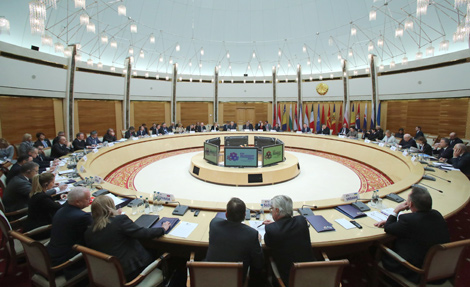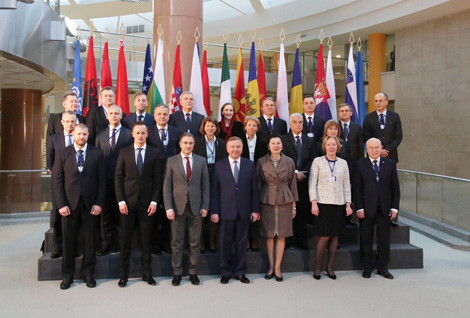Opinions & Interviews
CEI viewed as important venue for dialogue, cooperation

MINSK, 12 December (BelTA) – The Central European Initiative (CEI) has proved its relevance as a venue for promoting dialogue and cooperation in a wide range of areas, Belarus’ Prime Minister Andrei Kobyakov said at the CEI Meeting of the Heads of Government in Minsk on 12 December, BelTA has learned.
2017 was the year of Belarus’ presidency in the Central European Initiative. According to Andrei Kobyakov, it was not only a challenge but also an important and useful experience for the country. Belarus focused its CEI presidency on promoting compatibility and complementarity in a greater Europe. There is an increasing need to develop logistics and transport infrastructure in Central and Eastern Europe, especially in the context of aligning the Chinese Belt and Road initiative with the transport network of the European Union. During its CEI presidency Belarus did its best to add momentum to the effort to synchronize the plans on the joint expansion of transport infrastructure, simplify customs procedures, develop logistics services, and harmonize the digital markets of the CEI member states.
 The main theme of the summit is the role of CEI countries in promoting compatibility and complementarity between the various integration processes in a greater Europe, strengthening pragmatic economic cooperation between different integration associations, joining the efforts in confronting new threats to the stability in the region.
The main theme of the summit is the role of CEI countries in promoting compatibility and complementarity between the various integration processes in a greater Europe, strengthening pragmatic economic cooperation between different integration associations, joining the efforts in confronting new threats to the stability in the region.
Within the framework of its presidency in the CEI Minsk hosted a number of events, including a CEI ministerial meeting, a ministerial conference on science dedicated to the development of biotechnology and pharmaceutics, the CEI Parliamentary Assembly, a ministerial conference on mutual ties and compatibility in the CEI region, aligned with the new Silk Road, a meeting of national coordinators, and a working group on the CEI management.
 The Central European Initiative was founded in 1989 to promote the development of sustainable ties between the states of Central, Western and Eastern Europe in politics, economy and culture, and also to prevent the emergence of new dividing lines in Europe. Today this regional association includes 18 countries: Austria, Albania, Belarus, Bulgaria, Bosnia and Herzegovina, Hungary, Italy, Macedonia, Moldova, Poland, Romania, Serbia, Slovakia, Slovenia, Ukraine, Croatia, Montenegro, and the Czech Republic. Belarus joined the CEI in June 1996.
The Central European Initiative was founded in 1989 to promote the development of sustainable ties between the states of Central, Western and Eastern Europe in politics, economy and culture, and also to prevent the emergence of new dividing lines in Europe. Today this regional association includes 18 countries: Austria, Albania, Belarus, Bulgaria, Bosnia and Herzegovina, Hungary, Italy, Macedonia, Moldova, Poland, Romania, Serbia, Slovakia, Slovenia, Ukraine, Croatia, Montenegro, and the Czech Republic. Belarus joined the CEI in June 1996.







 print version
print version make home page
make home page add to bookmarks
add to bookmarks

